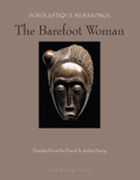
The Barefoot Woman by Scholastique Mukasonga (Our Lady of the Nile; Cockroaches) is a loving tribute to a strong mother and a striking work of memoir.
Mukasonga and her family lived as exiles in Rwanda in the years leading up to the genocide of the Tutsi. This time in her life, when they were all together and alive, was short, but Mukasonga has vivid memories, especially of her mother, Stefania, a leader in the makeshift village where they were regularly terrorized by Hutu soldiers. In an earlier memoir, Cockroaches, Mukasonga depicted the horrific end of her family. Here, she focuses on her mother: Stefania is a hard worker, always with her hoe in hand; a healer with a medicinal garden of grasses, tubers, roots and tree leaves; a "highly respected matchmaker"; and a dedicated, ever-vigilant protector of her children.
Extraordinarily, this book is at times horrifying in its content and at other times playful; lyric in its style and tender in its handling of the central character. While the reader's knowledge of the genocide to come hangs over the narrative, the everyday events often retain a quotidian feeling; Stefania and her neighbors worry over their children but also laugh and celebrate and arrange marriages. As a literary work, this establishes a rare balance. Jordan Stump's translation from the French beautifully conveys this sense of both tragedy and day-to-day joy.
The Barefoot Woman is also an essential record of traditions and a way of life that are in danger of disappearing. This is an adoring, gorgeously rendered memorial to a mother and testimony to a people. --Julia Kastner, librarian and blogger at pagesofjulia

